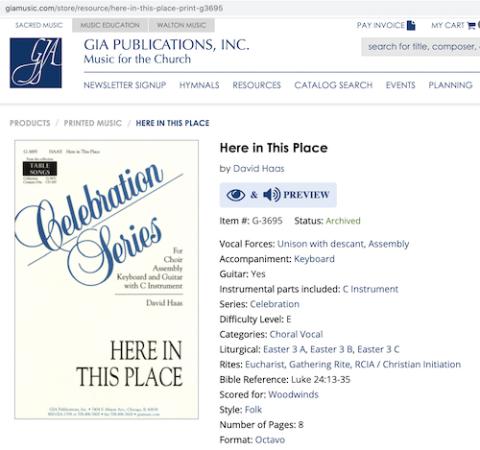
Screenshot of David Haas during a performance at the Los Angeles Religious Education Congress 2017 (YouTube/RECongress)

Screenshot of David Haas during a performance at the Los Angeles Religious Education Congress 2017 (YouTube/RECongress)
As allegations of serial sexual misconduct against Catholic composer David Haas continue to mount, a leading supplier of sacred music has vowed an investigation into how one of the church's best selling musicians' record of predatory behavior avoided scrutiny and accountability.
GIA Publications, which distributed the Gather hymnals that included some of Haas' best known works, told NCR in a statement that "a third-party assessment will create a strong survivor-centered structure to report incidents of alleged harassment or abuse."
"In addition to the assessment, we are in the process of establishing a Code of Conduct for all composers and authors we publish," said Kate Williams, senior managing editor of GIA Publications. "These changes will facilitate the community's ability to take prompt action in response to reports of behavioral misconduct."
The allegations against Haas, known for his popular contemporary hymns such as "You Are Mine," "We Are Called" and "We Have Been Told," were first reported on May 29 by Into Account, a nonprofit that works with and offers support to survivors of sexual and spiritual abuse.
On June 24, NCR reported accounts of three different women chronicling Haas' sexually predatory behavior toward them. All three were over the age of 18 at the time of the alleged incidents, but each of the women had previously participated in Haas' music workshops as students.
Into Account's executive director, Stephanie Krehbiel, told NCR that since the publication of its report against Haas, the organization has received nearly 40 reports from women across the United States, Canada and Australia alleging they experienced similar instances of sexual misconduct by Haas.
"The pattern that I've seen is that David Haas, when he traveled for conferences, for workshops, for concerts," said Krehbiel, "those were opportunities for him to target victims."
"What that indicates is that there are likely women in many, many places who have yet to figure out that their experience was not an isolated one," she said.
Advertisement
Following reports of misconduct, GIA said in June that it had terminated its relationship with Haas in January. One of his accusers had previously told NCR that they believe that there are professionals in the industry aware of Haas' behavioral history and yet failed to publicly address them.
Williams told NCR that GIA Publication's decision to cut ties with Haas in January was made after the company "heard a rumor" that his letter of suitability from the Archdiocese of Saint Paul and Minneapolis was under review.
"We did not receive confirmation from the Archdiocese that this was indeed the case," Williams continued in a statement. "On May 29, 2020, a letter from Into Account brought to light a systemic pattern of abusive behavior spanning decades. GIA subsequently made the decision to go public with our suspension on Saturday, June 13, and early the following week pulled Mr. Haas's music off of the market."
As for the internal investigation, Williams said GIA plans to retain a third-party firm "within the next week" and that the company expects the assessment to take between six to eight weeks.
Williams said that their investigation is not dependent on Haas' cooperation. A spokesperson for the Archdiocese of Saint Paul and Minneapolis told NCR that "if the Archdiocese is contacted and can be of assistance in determining the truth of what has happened, we would participate as we are able."

Screenshot July 24, 2020, from GIA Publication's website showing "Archived" status of David Haas' music.
In addition to the GIA assessment, Theresa Brown, the executive director of the Association of Catholic Publishers, told NCR that the organization is in the "early stages" of an internal conversation about developing a code of ethics for its members in response to the Haas case.
Krehbiel told NCR that while Into Account is not collaborating with GIA in the publisher's investigation, she said the two groups are engaged in "open communication" and that she "urges them to to be transparent about what they knew and when they knew it."
Although Haas initially described Into Account's report as "false, reckless and offensive," on July 9, he issued an apology on his website stating that "through a lot of prayer and reflection, I have come to realize that I have caused great harm to a variety of people."
"I make no excuses for any harm that I may have caused," he continued. "I take responsibility for my behavior and I am truly sorry."
Over the last month, a range of dioceses across the country, including Saint Paul and Minneapolis; San Jose, California; Venice, Florida; and Helena, Montana; have vowed to no longer use Haas' music.
Even so, Krehbiel says that Haas' fame and the fact that his music is widely beloved has made it difficult for some women to come forward.
"These women are fighting against the perception that they've taken away beloved pieces of music from people," she said. "That's a completely unfair burden to place on them."
"The more dioceses and archdioceses say that we're not going to play his music, the more priests and pastors address it from the pulpit, the more people talk about accountability and not just healing and forgiveness," she continued, "the safer it will be for these women to come forward."
[Christopher White is NCR national correspondent. His email address is cwhite@ncronline.org. Follow him on Twitter: @CWWhite212.]







